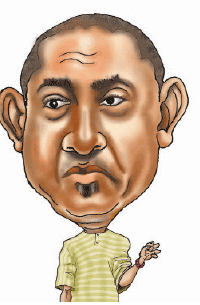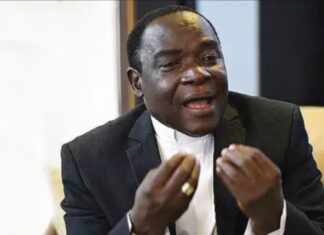I would need to dwell on the First Chapter of Part One in some detail, since it contained aspects of his personality that endured into adulthood and powered almost all that drove him along on the path of uniqueness. His title for this chapter is ‘Early Intimations’. He drew upon his experience in ‘Childhood’ during which he developed his firm conviction in what is right and what is wrong and what is just or unjust. His lineage fought an overbearing traditional ruler, and drove him out of his throne. He had a spell in the United Kingdom in his formative years and was bitten by the racism bug and had that experience burnt into his psyche.
While in the UK as a citizen of colonial Nigeria, and apartheid was at its worst, he sought to prepare himself for combat with that continental scar. He had a heavy dose of good luck that he was not whisked away for combat in Egypt. He had the guidance of higher powers to escape conscription as infantryman. His father’s lights upon his military plans as divergent from his intention rankled him and distanced him somewhat from his father. The rebel against imposition in his character surfaced there. And that represented one of his weaknesses worth commenting upon. His father must have had some pains with his truculence. I can imagine that “Essay” S. A. Soyinka must have let him be from then on. This licence probably widened his risk capacity, but he received formidable shield from the Elemental Beings that supported his mission to fight wrong causes which he designated as Ogun. He was later to confirm this in his hunting expeditions. His mother probably gave up and sought transcendental protection from his highly mobile son.
It was natural for him to be involved with the struggle for emancipation of Blacks in South Africa later on during which he made close acquaintance with Nelson Mandela, who preceded him as a Nobel Laureate. Although he would have preferred to head for South Africa to fight promoters of apartheid, he was called up for war to re-colonise Egypt over Suez Canal. He called up his theatrical wits and faked density of language and character in order to avert the draft. Wole vanished and was forgotten after the war was won and lost. His intuitive perception was acute in most circumstances and this accounted for his survival capacity amid tremendous odds that could have resulted in his elimination.
Further down in the work, he had gauntlets to run with trigger-happy soldiers in company of a mutual friend, Bola Ige. He escaped ambush by the whiskers many times from Sani Abacha’s head-hunters. All these were abundant evidence of protection by his ancestral deities whom he revered above competing tenets of received religions. He believed in a Supreme Being alright, but one can read that he recognised lesser governors of our own plane who receive radiation from The Godhead for their activities here in Creation.
Wole was a woman’s man. Although he did not, for decency, narrate his escapades with women, he left indices that he was through and through an exponent of polygamy or its close variant flirtation. He has the charm and image women would gladly attach themselves to. He was a world figure, even before his Nobelist stature. He was debonair. He was a magnetic conversationalist. He did not allow fools in his company because he valued his time for changing things highly. He was a moving volcano when it came to combat with rapists of the common will. He was loyal to his friends, worshipped them given proven trust not betrayed and accommodated their shortcomings.
I do not intend to bore the reader to the extent that reading Wole’s Magnum “Memoirs” would be made unnecessary. I believe that essential components of his personality have been captured in these four episode treatment.
I can imagine that he will later find it difficult to settle down to one location, even in old age. His penchant for travel, will only increase with his global commitments, and accentuate his profiles and those of others who have even the slightest acquaintance with him.
His health is splendid. I have not heard of his hospitalisation. He has not indicated that in his work. But he has known psychological disappointments and traumas which he fought and conquered over time.
No one who has not travelled wide globally will appreciate this work. No one who has not read memoirs of famous people will appreciate the special worth of this work. No one without reverence for classics will appreciate the quality of our compatriot’s work in 577 pages of historiography of Africa’s most populous nation and much more. No one will doubt Wole’s qualification for his status as a Nobel Laureate. No author living and/or dead will score him below excellent in presentation, content, diction, humour, perspicacity of personal character and the work’s relevance to the human condition in today’s world.
Students of African and Nigerian history will not know fulfilment without this work. It is rich in details of chronology of events that sunk Nigeria into the abyss we now experience. If our First Republic leaders could spend our money on white prostitutes without qualms and pangs of conscience and our military pretenders could run us deep into the abyss of despair in our future, and remain relevant, then our doom is sealed. Perhaps Wole’s gods and goddesses and our own volitions may yet save us from wiping ourselves out with greed, envy and covetousness.
Perhaps Wole’s approval of General Muhammadu Buhari may start our repair process. I believe strongly however that only restructuring of the nation with total reverence for agreed true federalism will save us from danger in the years ahead. In this alone, I vary with Wole Soyinka without diminished reverence for his artistic endowments.















